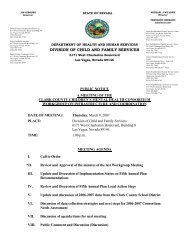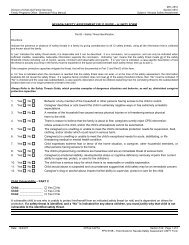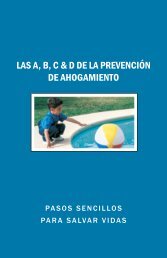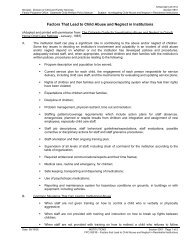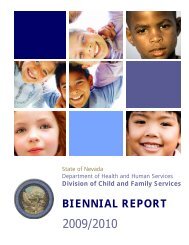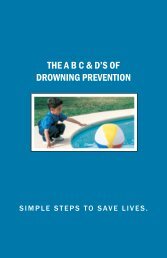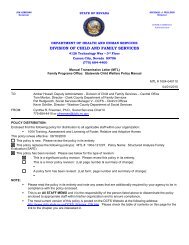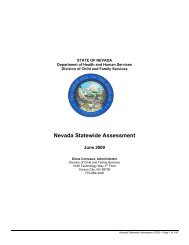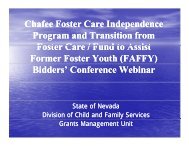STATE OF NEVADA - Division of Child and Family Services
STATE OF NEVADA - Division of Child and Family Services
STATE OF NEVADA - Division of Child and Family Services
Create successful ePaper yourself
Turn your PDF publications into a flip-book with our unique Google optimized e-Paper software.
Implementation <strong>of</strong> a 36-hour pre-service foster parent training curriculum<br />
Involvement <strong>of</strong> foster care providers in case planning<br />
Promotion <strong>of</strong> the development <strong>of</strong> a Foster Parent Bill <strong>of</strong> Rights<br />
To continue the efforts <strong>of</strong> this initiative <strong>and</strong> to address the quality <strong>of</strong> care st<strong>and</strong>ards required by<br />
the Adoption <strong>and</strong> Safe Families Act (ASFA), DCFS formed a Quality <strong>of</strong> Care St<strong>and</strong>ards (QCS)<br />
Statewide Task Force. The Task Force reviewed current st<strong>and</strong>ards <strong>and</strong> suggested additional<br />
st<strong>and</strong>ards to improve services <strong>and</strong> practices. The QCS Task Force was composed <strong>of</strong> child<br />
welfare managers, supervisors, social workers, specialists, foster care providers, <strong>and</strong><br />
representatives from County social services. The Task Force represented Nevada’s three<br />
geographic regions: north, south, <strong>and</strong> rural. Five areas were addressed by the Task Force:<br />
1. Foster care licensing<br />
2. Training<br />
3. Retention <strong>and</strong> support<br />
4. Quality <strong>of</strong> care for foster children<br />
5. Pr<strong>of</strong>essionalization <strong>of</strong> foster caregivers<br />
After an initial review <strong>and</strong> recommendation report was developed, the QCS Task Force<br />
membership was dissolved into other groups that continue to evaluate the five areas outlined<br />
above <strong>and</strong> to recommend ways to improve the delivery <strong>of</strong> services <strong>and</strong> quality <strong>of</strong> care for<br />
children in foster care.<br />
Specific to the training implemented by the Task Force, Nevada adopted a 36-hour pre-service<br />
training curriculum in 1997, which is required <strong>of</strong> all potential foster <strong>and</strong> adoptive families. The<br />
training is designed to provide families with knowledge <strong>and</strong> skills that can greatly contribute to<br />
their success. Some families will decide that foster care <strong>and</strong>/or adoption is not for them, while<br />
others will begin to gain an underst<strong>and</strong>ing <strong>of</strong> the role <strong>of</strong> their family <strong>and</strong> how additional children<br />
can enhance their family life.<br />
The northern <strong>and</strong> southern regions have trainers on staff who provide the 36-hour pre-service<br />
training. The rural region contracts out to a local provider to recruit <strong>and</strong> train foster homes,<br />
using the same pre-service curriculum. This is an established curriculum developed by the<br />
Institute for Human <strong>Services</strong> in Columbus, Ohio, which is widely considered to be state-<strong>of</strong>-theart<br />
training.<br />
Beginning in 2002, since the implementation <strong>of</strong> the integration <strong>of</strong> child welfare services in<br />
Washoe <strong>and</strong> Clark Counties, the training now varies by region in terms <strong>of</strong> hours required <strong>and</strong><br />
curriculum content, ranging from approximately 22 to 36 hours. However, since only eight<br />
hours are required by law, the regional training requirements significantly exceed the minimum<br />
established requirements.<br />
CRP ANNUAL REPORT 2009 27



